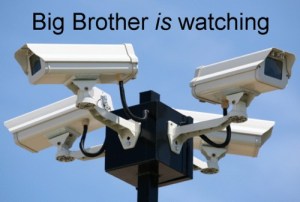
NetworkWorld has an interesting article entitled How to use electrical outlets and cheap lasers to steal data. The article discusses a presentation that will be held at the Black Hat USA conference later this month.
The deal is that two researchers are supposedly going to demonstrate how keystrokes can be read from a remote computer using either a laser, or signals transmitted over the ground line coming from a nearby computer.
While these techniques might be interesting to know about, somehow I think we have bigger things to worry about.
Read on to see what I mean…
First of all, the presentation is supposed to be significant because anyone with the proper knowledge and a bit of inexpensive equipment can do it:
“The only thing you need for successful attacks are either the electrical grid or a distant line of sight, no expensive piece of equipment is required,” Barisani and Bianco say in a paper describing the hacks.
The equipment to carry out the power-line attack could cost as little as $500, and the laser attack gear costs about $100 if the attacker already owns a laptop with a sound card, says Barisani. Carrying out the attacks took about a week, he says.
So how do these techniques work? It’s actually pretty simple. For the power line snooping:
In the power-line exploit, the attacker grabs the keyboard signals that are generated by hitting keys. Because the data wire within the keyboard cable is unshielded, the signals leak into the ground wire in the cable, and from there into the ground wire of the electrical system feeding the computer. Bit streams generated by the keyboards that indicate what keys have been struck create voltage fluctuations in the grounds, they say.
Attackers extend the ground of a nearby power socket and attach to it two probes separated by a resistor. The voltage difference and the fluctuations in that difference – the keyboard signals – are captured from both ends of the resistor and converted to letters.
To pull the signal out of the ground noise, a reference ground is needed, they say. “A “reference” ground is any piece of metal with a direct physical connection to the Earth, a sink or toilet pipe is perfect for this purpose (while albeit not very classy) and easily reachable (especially if you are performing the attack from [a] hotel room,” they say in their paper.
Well, that’s pretty nifty. There’s one little problem: this isn’t anything new. It has long been known that computers “leak” signals that can be picked up with the right equipment. In short, intelligence agencies have had toys like this for ages already. No, their toys aren’t nearly as cheap, but you can bet they’re a helluva lot more effective. Granted, part of the point of the upcoming presentation is to show how cheaply the power line technique can be done. But still… This isn’t exactly earth-shattering news to those of us who know a thing or two about how computers work.
[ad name=”banner”]
In any case, on to the laser technique:
Attackers point a cheap laser, slightly better than what is used in laser pointers, at a shiny part of a laptop or even an object on the table with the laptop. [Like, say, all those ever-so-popular glossy screens and cases??] A receiver is aligned to capture the reflected light beam and the modulations that are caused by the vibrations resulting from striking the keys.
This modulation is converted to an electrical signal that is fed into a computer soundcard. “The vibration patterns received by the device clearly show the separate keystrokes,” the researchers’ paper says. Each key has a unique vibration pattern that distinguishes it from the rest. The spacebar creates a significantly different set of vibrations, so the breaks between words are readily apparent.
All that’s left is to analyze and “decode” which sound is for which key, which – as the article notes – isn’t terribly hard to do if you know the language being used. Certain letters are used more than others, and words like “the”, “a”, “on”, “in”, etc. can give some easy-to-spot clues in order to quickly decipher the message being typed. Write a little program, and you can very easily create a “secret decoder ring” for a variety of languages.
Cool, yes. But again, nothing terribly new here…
And in the grand scheme of things, really, who cares? If you’ve never heard of projects like Echelon, get busy reading.
You see, there are certain things that we the public know, and there are certain things we don’t know. In the words of that ancient horse’s ass Donald Rumsfeld: “There are known knowns, unknown knowns, known unknowns… Can I stop now? Are you sufficiently confused?” No Don, we aren’t.
In other words, we know that even the intelligence agencies of our own countries spy on us, as well as on each other. We know that they will not publicly reveal their capabilities, because that would be pretty dumb. Those of us who are technically inclined can also observe the types of technologies available, and imagine new uses of certain technologies which should be quite feasible given a large enough budget. We also know that black budgets for intell agencies are generally larger than the number of figures in Donald Rumsfeld’s age – which is to say really, really, really big.
Thus, we can certainly theorize that when our governments tell us they have optical satellites with a one meter resolution, they are lying through their teeth. We can also theorize that while the maximum range of things like WiFi are very small for us mere mortals, with the proper technology and the proper budget, there is no reason why such signals could not be read and easily decrypted at much, much greater distances.
Oh, I know – you’re going to say that physics comes into play here! It’s just not possible! Right. And neither is nuclear fusion, superconductivity, and of course, the internet doesn’t exist at all! My point is that engineers and scientists are in the business of finding ways around physical laws as we understand them, and/or discovering or refining old laws to more accurately reflect reality. Because let’s face it, we don’t even understand how gravity works for god’s sake. So don’t quote me any physics text books, please.
You may also be thinking that such secrecy would not be possible. Please research the history of the development of the atomic bomb in the United States. Secrecy isn’t only possible – it’s highly probable and it happens all the time. You keep secrets from others, right? So why would you assume that your leaders don’t?
In any case, fancy Star Trek type scanners in some satellite floating above the earth aren’t even necessary. Why not?
Well, it’s really rather simple. If you’ve ever worked for a telecom manufacturer on the design of the equipment that forms the backbone of our global communications network, then you know that there are – by law – back doors built into every system. Of course, we’re told they’re required by law and only used with a court order. Yeah, right…
So you see, two guys reporting on some inexpensive snooping techniques is the least of your worries. Yes, your nerdy neighbor may now spy on you and figure out what you’re typing to Grandma Francine, but who cares? In an era when “terror” is the name of the game and having the wrong skin color means you’ll be interrogated by some dumbass hillbilly in US airports, it isn’t your nerdy neighbor who you have to watch out for.
Well, unless he works for some government agency…
So, don’t worry! You are no more unsafe now than you were before. In fact, you were never safe. There is no such things as safety or security. There is only the illusion of such that makes people do the damnedest things – like giving up any freedoms, safety, and security they may have had all in the name of preserving freedom, safety, and security.
What can I say? People are emotional reaction machines, and many of our leaders know it and take advantage of it.
Now that’s something to care about.


As you say that essentially this is nothing new – read about it in a different manner in the novel ‘Cryptonomicon’ quite some time ago. When reading your article however, something came to mind which is that utility companies (electrical) are now starting to bind peoples power grids in automated usage radio signaling or smart meters. From what is understood, these can measure every nuance of a serge, every amperage fluctuation to the point that they can tell exactly what appliance is running, when and for how long. It would not be hard to then acknowledge, like you mention about proper technology tapping wifi, that this radio frequency house attachment could even do perhaps more – well Sheesh.
Thanks for summing it all up this way.
Quote “So, don’t worry! You are no more unsafe now than you were before. In fact, you were never safe. There is no such things as safety or security. There is only the illusion of such that makes people do the damnedest things – like giving up any freedoms, safety, and security they may have had all in the name of preserving freedom, safety, and security.
What can I say? People are emotional reaction machines, and many of our leaders know it and take advantage of it.”